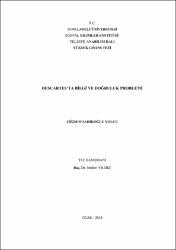| dc.contributor.author | Sadıkoğlu Yolcu, Çiğdem | |
| dc.date | 2019-04-11 | |
| dc.date.accessioned | 2019-04-11T11:41:10Z | |
| dc.date.available | 2019-04-11T11:41:10Z | |
| dc.date.issued | 2016-02-11 | |
| dc.identifier.citation | Sadıkoğlu Yolcu, Ç. (2016). Descartes'ta Bilgi ve Doğruluk Problemi. Yüksek Lisans Tezi. Kırklareli Üniversitesi Sosyal Bilimler Enstitüsü, Kırklareli. | |
| dc.identifier.uri | https://hdl.handle.net/20.500.11857/785 | |
| dc.description.abstract | Yeniçağ felsefesi bilgi ve doğruluk kavrayışı bakımından önceki anlayışlardan önemli ölçüde ayrılır. Bu, doğanın nasıl anlaşılacağına dair yeni yaklaşımları da beraberinde getirir. Bilimde Copernicus'in Güneş merkezli evren hipotezi ve Galile'nin matematik temelli doğa anlayışıyla birlikte, duyular ile değil, öncelikle "akılla kavranan evren" tasavvuru öne çıkmıştır. Descartes bu yaklaşımın felsefe alanındaki ilk ve en önemli temsilcisidir. Descartes'a göre, evren matematiksel ilkeler temelinde açıklanmalı; empirik kaynaklara dayanan çıkarımlar yerini tümdengelimsel olanlara bırakmalıdır. Descartes'ın öncüsü olduğu bu bakış açısı, Kant'ın Kopernik devrimi ile birlikte, doğayı belirleyen, ona kendi kategorilerini dikte eden bir zihin anlayışına doğru evrilirken, Kuhn'un "Paradigmalar" kuramı ile de 20. yüzyıldaki yansımasını bulur. | |
| dc.description.abstract | Modern Philosophy differs in important respects from the earlier accounts in its conception of knowledge and truth. This brings with it new approaches concerning the proper understanding of nature. In the area of science, with Copernicus' hypothesis of a heliocentric universe and with Galileo's understanding of nature as based on mathematics, conception of universe primarily "grasped with reason", not through the senses, came to the fore. Descartes is the first and most important representative of this approach in the area of philosophy. According to Descartes, the universe shall be explained on the basis of mathematics and empirically based inferences shall give way to deductive ones. This point of view, of which Descartes is the forerunner, evolving with Kant's Copernican Revolution into an understanding of mind that determines nature, that imposes its own categories onto it, finds its expression in 20th century in Kuhn's theory of "Paradigms". | |
| dc.language.iso | tur | |
| dc.publisher | Kırklareli Üniversitesi Sosyal Bilimler Enstitüsü | |
| dc.rights | info:eu-repo/semantics/openAccess | |
| dc.rights.uri | http://creativecommons.org/licenses/by-nc-nd/3.0/us/ | * |
| dc.subject | Descartes | |
| dc.subject | Cogito | |
| dc.subject | Episteme | |
| dc.subject | Paradigma | |
| dc.subject | Doğruluk | |
| dc.subject | Truth | |
| dc.subject | Paradigm | |
| dc.title | Descartes'ta Bilgi ve Doğruluk Problemi | |
| dc.title.alternative | The Problem of Knowledge and Truth in Descartes | |
| dc.type | masterThesis | |
| dc.department | [KLÜ] | |
| dc.relation.publicationcategory | Tez | |





















